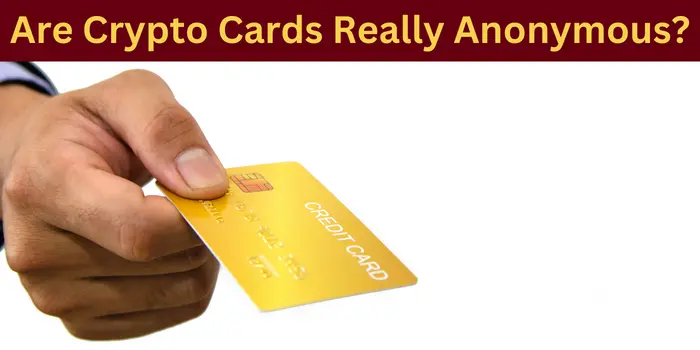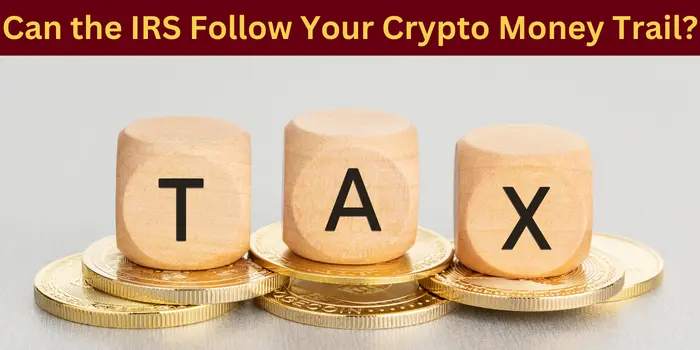
Unravel the mystique around crypto cards like Bitcoin debit cards; while they simplify using digital currencies, they don't keep you entirely hidden.
Thanks to government REGs, complete anonymity remains a pipe dream, but pseudonymity is at hand.
So, is your Bitcoin transaction entirely under the radar? Not quite, as each transaction leaves a breadcrumb trail on the blockchain, inviting the potential for tighter laws to keep the shady stuff at bay. In fact, these digital money swipers definitely aren't as secret as you might think, due to rules requiring checks on who's using them.

The truth is, it's a bit more complicated than a simple yes or no. Let's break it down.
Bitcoin transactions aren't invisible. They're what we call pseudo-anonymous or “Pseudonymous”. Think of it like writing a book under a pen name. Sure, your real name isn't out there, but if someone does a bit of digging, they might figure out who you are.
The tech behind Bitcoin, the blockchain, is like a giant, public scoreboard that keeps track of all the coins moving around. It doesn't show names, but it does show a unique code for each transaction. Now, if you're just moving Bitcoin around, that code doesn't have your name on it, which gives you some privacy.
But, here's the kicker. When you want to change your Bitcoin into regular money or use a Bitcoin exchange, you usually have to tell them who you are. This process is called Know Your Customer or KYC. This means your secret code is linked to your real-world identity.
Also, people can follow Bitcoin transactions with tools like a blockchain explorer. It's like a magnifying glass for the giant scoreboard. But finding out who's behind a certain transaction can be like finding a needle in a haystack and can take a whole lot of time.
The thing is, even though it's hard, governments can still uncover who's behind a Bitcoin wallet if they suspect shady business. This is why we're seeing more rules being put in place to stop illegal activities.
Some people try to be crafty by using lots of different wallets or mixing up their Bitcoin to confuse anyone who's looking. But these tricks don't make you completely untraceable and trying to hide for the wrong reasons is a big no-no.
It's important to remember that Bitcoin, like most digital currencies, is pseudonymous, not anonymous. While some coins like Monero, Bytecoin, and Zcash go the extra mile to hide transactions, Bitcoin isn't one of them.
However, privacy isn't just about covering up bad behavior. Many people value their financial privacy for entirely legitimate reasons. But, if you're playing with Bitcoin, you should know it's not a cloak of invisibility. Your transactions are more like a game of hide and seek.

In a nutshell, a crypto card is a kind of debit card that lets you pay for stuff with cryptocurrencies like Bitcoin, just as you would with normal money. This can be handy for shopping online or even at your local grocery store, especially if those places don't take digital cash directly.
Now, you might wonder if you can keep your identity a secret while using these cards. After all, one of the big draws of cryptocurrencies is the privacy they offer. Wouldn't it be great to enjoy that same anonymity while using a crypto debit card?
Here's the deal, though. When it comes to issuing these crypto cards, companies can't just hand them out without checking who their customers are. It's the law. Government rules say they need to know the names, addresses, and other personal details of card users. This helps prevent folks from using these cards for dodgy dealings like escaping taxes, funding bad guys, or cleaning dirty money.
So, if you were dreaming about a debit card that offers you the privacy of cryptocurrencies, it's not going to happen anytime soon.
But hold on a minute, you might be thinking. Didn't some company try to launch a super-secret card not too long ago? You're right! In December 2022, a company named Zelf made headlines with their anonymous Visa Debit card that could be refilled with crypto. But guess what? While doing my research I came across their site, and it appears as though they had to pull the plug on that idea the same day they announced it! Here is the link to Zelf.co, with their explanation.

You might be wondering if your digital cash stash can stay under the radar of the taxman. Let's get one thing straight - the Internal Revenue Service can absolutely keep tabs on your cryptocurrency dealings. Let's break down how they do it.
A lot of the time, the IRS gets wind of your crypto moves from third parties, like cryptocurrency exchanges. These are the online platforms where you buy, sell, and trade digital currencies. If you're using one of these platforms and they give you a form like a 1099-K or a 1099-B, it's like a big neon sign to the IRS that says, "Hey, this person is trading cryptocurrency!"
Now, you might be thinking, "What if I'm using an exchange that doesn't report to the IRS?" Well, the IRS has got that covered too. They have the power to issue subpoenas. It's like a court order that says, "You have to give us this information."
They've used these to make several exchanges spill the beans on specific user accounts.
But the IRS doesn't just rely on others. They've got their own bag of high-tech tricks. They work with blockchain companies and use super-smart computer programs to analyze data, spot patterns, and pick up on any sneaky business across billions of transactions. It's like they have a team of digital detectives constantly scanning the crypto-verse.
The IRS counts cryptocurrencies as property, and just like a house or a car, you have to pay taxes on it. If you don't, you can face some hefty penalties. So, it's always a good idea to tell the IRS about your crypto dealings yourself, rather than waiting for them to find out.
Even though cryptocurrencies were designed to offer some level of anonymity, the IRS has still found ways to lift the veil. They can check out all the transactions recorded on the public ledger, and with some high-tech help, they can trace these back to individuals.
So, while it might be tempting to think you can hide your digital cash from the IRS, it's really not worth it. They've got the tools and the power to follow the money trail, and when they catch up with you, the penalties can be harsh. It's much better to play by the rules, report your crypto transactions correctly, and avoid any unpleasant surprises at tax time.
Ever wondered if Bitcoin ATMs keep your identity secret? The answer is, mostly, yes. When you buy Bitcoin with cash from one of these machines, you generally don't need to flash any ID. If you don't already have a place to store your Bitcoins, it’s alright, the machine can whip up a new paper wallet for you. Thanks to Bitcoin's design and the fact that smaller transactions don't usually need much checking, using a Bitcoin ATM can be a pretty private affair.
Wondering if stolen crypto can be tracked down? It's a tough nut to crack, thanks to blockchain's anonymous and decentralized setup which makes finding the bad guys tricky. However, if you team up with cybercrime cops and blockchain sleuths, you might trace where the stolen funds ended up. Exchanges and service providers can also help put a freeze on stolen assets and tighten up security. But remember, prevention is better than cure, so keep your crypto safe by educating yourself, using secure hardware wallets, and being scam-aware.
Ever wondered if someone could use your stolen credit card to buy crypto? Unfortunately, on some platforms where user checks aren't that strict (There’s No KYC… “know your customer”), it's possible. Remember, stealing a credit card is a serious crime that could land someone in jail with hefty fines. The real kicker is that because of the way crypto transactions work, if your stolen card is used to buy crypto, getting your money back can be tough. So, always keep your card details safe and keep a sharp eye on your statements for any transactions you don't recognize, especially on crypto platforms.
In a nutshell, while the world of cryptocurrencies, including crypto cards and Bitcoin transactions, may seem like a hidden universe, it's far from invisible to authorities. Due to regulations, crypto cards can't offer full anonymity; your identity needs to be checked before you can get your hands on one. Bitcoin transactions, while somewhat masked on the blockchain's public ledger, can be tracked by governments if they suspect something fishy. And let's not forget the taxman - the IRS has a toolbox full of methods to keep tabs on your crypto dealings, from third-party reports to high-tech systems. So, the takeaway message is clear: when dealing with cryptocurrencies, always stick to the rules. Since complete anonymity really isn’t a reality and trying to outsmart the system could land you in hot water with potential penalties and legal issues.